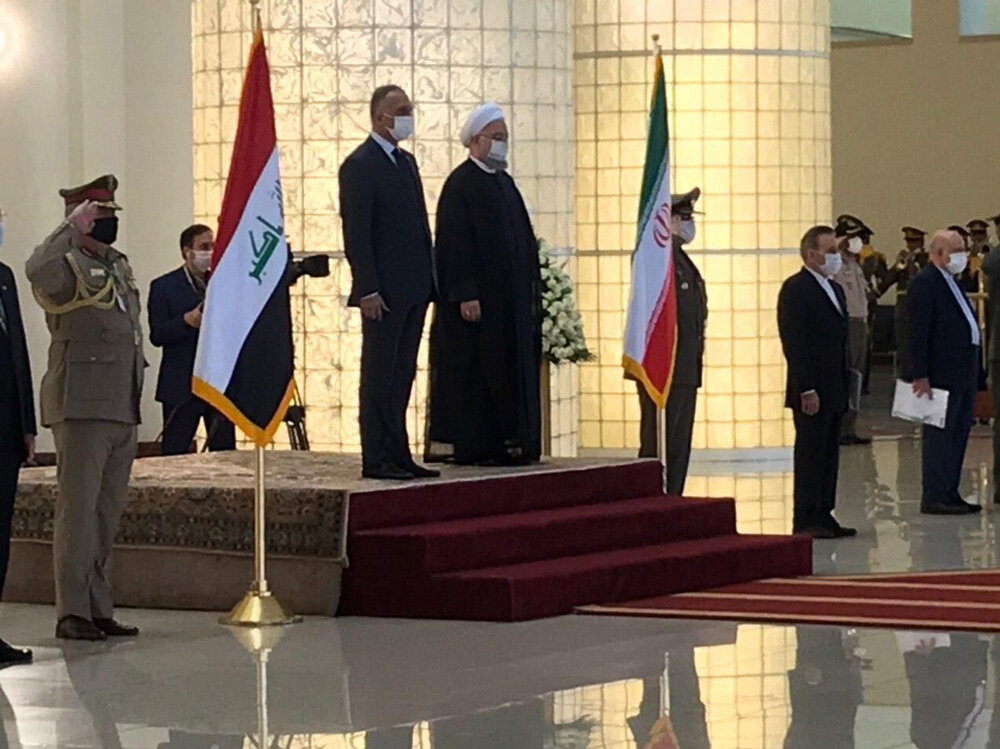Alwaght- Iraqi Prime Minister Mostafa al-Kadhimi visited Tehran on Tuesday heading a high-ranking delegation for talks with the Iranian officials.
Al-Kadhimi was accompanied by Finance Minister Ali Abdulamir Alwai, Foreign Minister Fuad Hussein, Planning Minister Khaled Batal Alnajm, Defense Minister Juma Anad, Oil Minister Ehsan Abdujabar, Electricity Minister Majed Mahdi Hantoush, head of Council of Ministers Hamid Naeem al-Ghezi, National Security Advisor Qassem al-A'araji, the PM advisors Salem Jawad al-Jalbi and Suha Dawoud al-Najar, the PM schedule coordinator Hussein Rashid al-Sheikh, the chief of Iraqi Bank of Commerce Faisal al-Humais, and some members of the PM office.
Al-Kadhimi met with the Leader Sayed Ali Khamenei, President Hasan Rouhani, National Security Council chief Ali Shamkhani, and the parliament speaker Mohammed Baqer Ghalibaf.
The other delegation members met their counterparts to discus political, security, and economic cooperation between the two neighbors.
But what are the drives behind the Iraqi PM trip to Iran? From what aspect is it significant?
The symbolic importance of al-Kadhimi Tehran visit
In the visits and meetings exchanged by politicians of world countries, the symbolic aspect of the visits and negotiations are more important than the results and agreements. Al-Kadhimi’s visit to Tehran is no exception. It is the first foreign trip to the PM since he was named for the post on May 7 and demonstrates the Iranian importance to the new Iraqi government that was formed after months of power vacuum.
The important point is that since 2005 that a new government came to power in Iraq after Sadam Hussein was toppled in 2003, visits to Tehran have always been top priority for the new heads of Iraqi cabinets. Ibrahim Jaafari, first Iraqi minister after Sadam rule, during his one-year term visited Iran after 45 years in July 2005. Nouri al-Maliki, Haider al-Abadi, and Adel Abdul Mahdi as consecutive PMs of Iraq visited Iran several times and emphasized expansion of diplomatic and strategic relations between the two nations.
In the current conditions, Al-Kadhimi travel to Tehran is symbolically important because some experts have raised the assumption that the new PM is taking anti-Iranian approach contrary to his predecessors and does not intend to play in the Iran court and consider the Iranian interests. The observers suggest that since his taking the post, al-Kadhimi sent negative and meaningful signals to Iran and its allies in Iraq.
But the visit to Tehran as the first foreign visit since assumption of office symbolically highlights the Iranian place in al-Kadhimi mind and to a large extent discredits some analyses that he has anti-Iranian inclination.
Planning and strengthening strategic ties for post-coronavirus period
It needs to be taken into account that the Iranian-Iraqi relationship has been deep and strategic over the past years. And what the new PM policy has so far shown is that he is quite conscious of giving the ties with Tehran a new life in post-coronavirus period. Actually, since the beginning of his job as PM, al-Kadhimi has shown that he is quite interested to hone ties with the Islamic Republic. A proof to that is his order for reopening all of the border crossings with Iran that were closed down when the pandemic began to spread.
The two countries are planning to promote bilateral trade to $20 billion or even beyond. This blueprint for their trade boost was unveiled when last year the Iranian president visited Iraq. Additionally, the Iraqi delegation during the two-day visit discussed trade, energy, transportation, border crossings, and even security with Iranian side and both sides are resolved to save their strategic relations and bolster them.
Is al-Kadhimi mediation between Tehran and Washington-Riyadh alliance real?
Among other goals of the trip, there are speculations that al-Kadhimi exchanged messages between Iran on the one hand and the US and Saudi Arabia on the other hand. The guesses about the mediation are made as al-Kadhimi is scheduled to visit Saudi Arabia and the US after Tehran trip. Although his Riyadh visit was delayed due to the admission of the Saudi King Salman bin Abdulaziz to hospital on Monday, political analysts believe that the PM is likely seeking to make peace between the two camps.
But just contrary to this speculation, during Zarif’s Monday trip to Iraq, Iran made it clear that it did not make any request to Iraq for mediation between Iran and the US-Saudi alliance and will not.
The reality is that al-Kadhimi is trying to adopt a policy of positive balance in dealing with the regional and international powers playing a role in Iraq. According to the new Iraqi government’s policy, Baghdad has no plan to eliminate one actor in its equations in favor the other and that it intends to keep close relations with both Tehran and Riyadh. But the relations with the US are separate and the main focus is on the Washington-Baghdad strategic dialogue that was started in June and through which the Americans want to put the bilateral relationship on a sustainable basis for long-term influence in the Arab country.



























